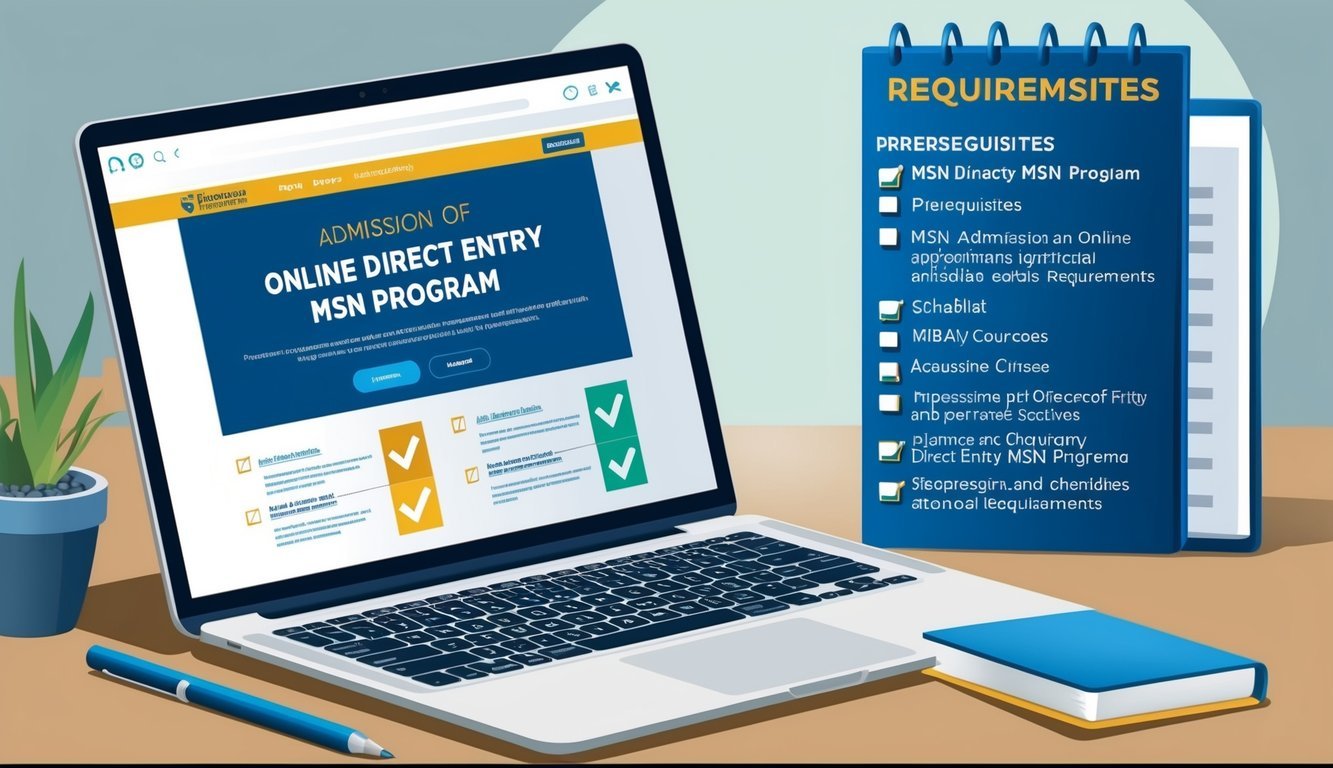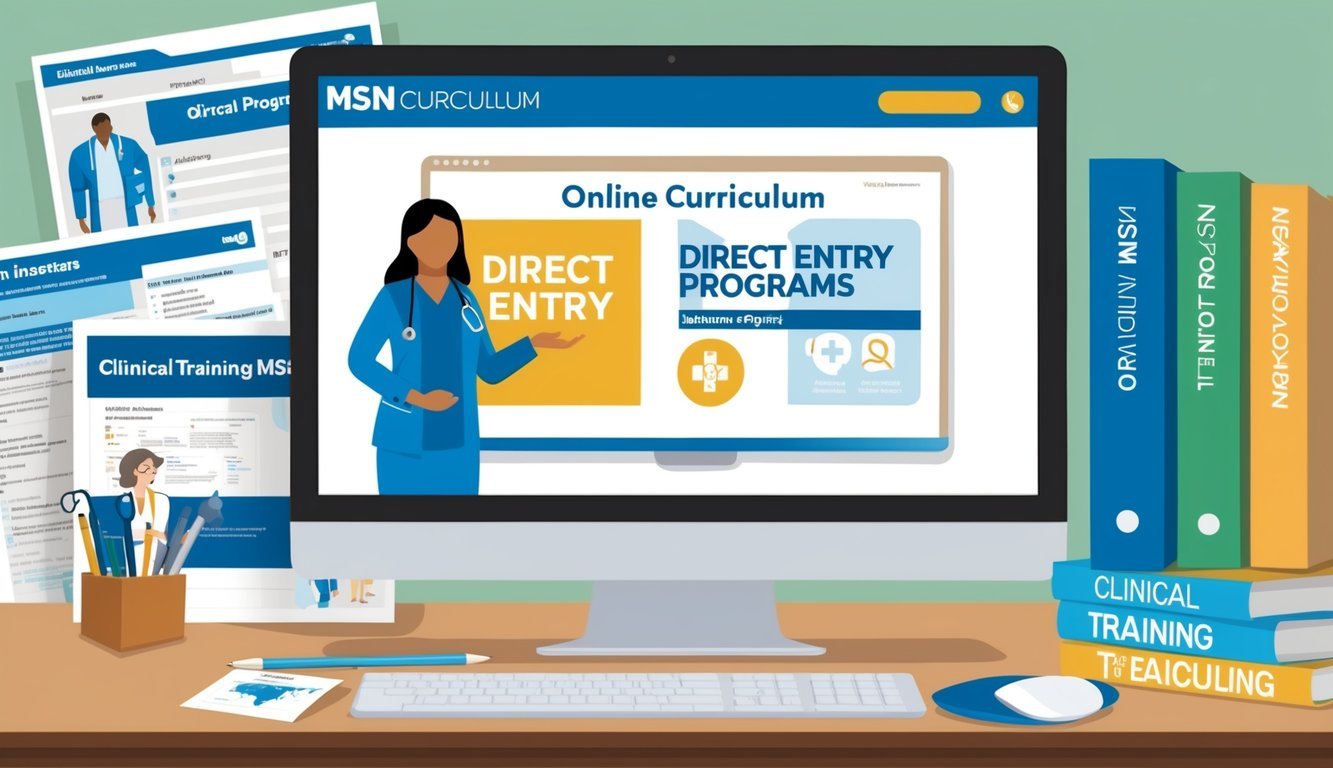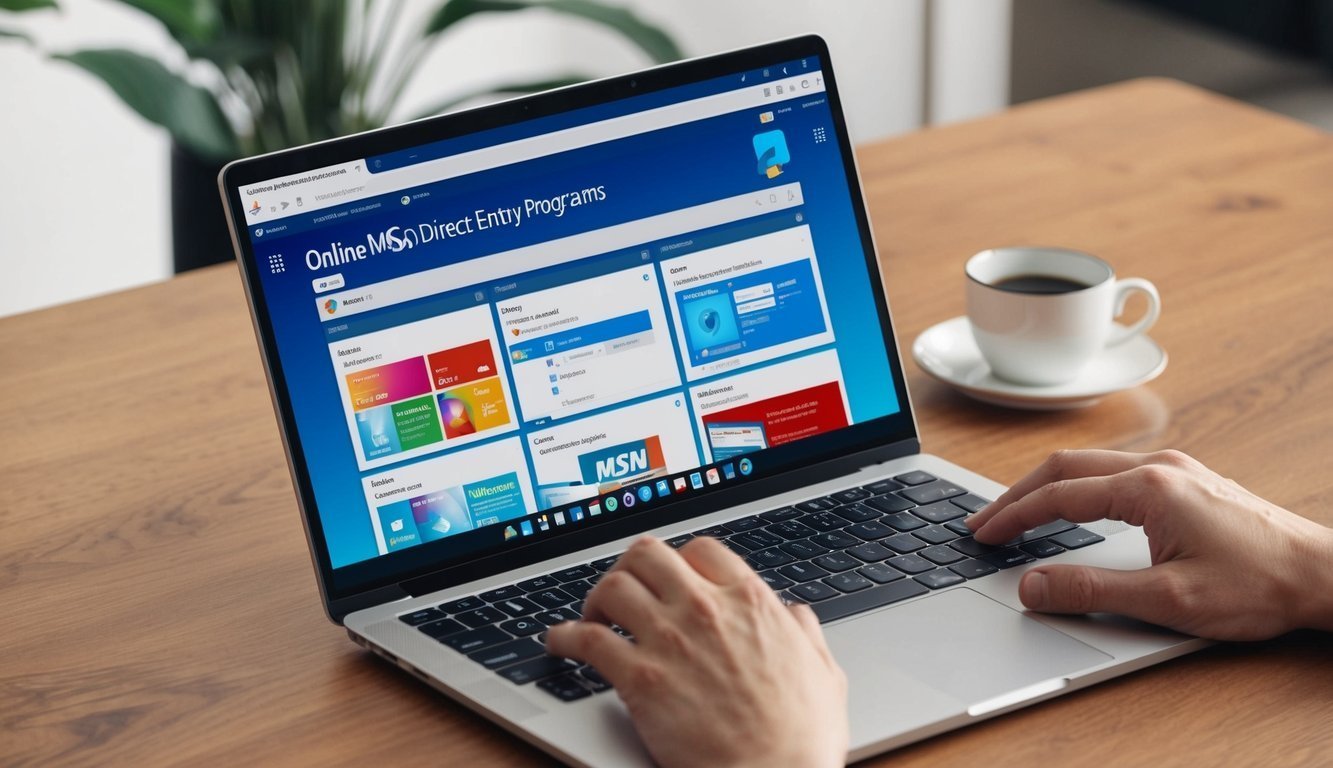Online direct entry Master of Science in Nursing (MSN) programs offer a unique path for individuals without a nursing background to enter the nursing field quickly. These programs combine both BSN and MSN content, allowing you to transition into a nursing career in about two to three years while earning your degree. With the growing demand for nurses, this option provides an efficient way to achieve your career goals.
You will engage in comprehensive coursework and hands-on clinical training, preparing you to take important licensure exams.
Many programs support online learning, making it easier to balance your studies with other responsibilities.
If you are eager to make an impact in healthcare, an online direct entry MSN program might be the right choice for you.
Key Takeaways
- Online direct entry MSN programs allow non-nurse students to earn a nursing degree quickly.
- Clinical training is a key component of these programs, ensuring hands-on experience.
- Graduates can pursue various nursing roles and advance their careers in healthcare.
Understanding Direct Entry MSN Programs
Direct Entry MSN programs provide a pathway for individuals with a non-nursing bachelor’s degree to enter the nursing field.
These programs enable you to earn a Master of Science in Nursing (MSN) and prepare for advanced roles in healthcare.
Here’s what you need to know about these programs.
Definition and Overview of Direct Entry MSN Programs
A Direct Entry MSN program is designed for those who hold a non-nursing bachelor’s degree and wish to become registered nurses (RNs).
This program typically includes both classroom instruction and clinical experience, allowing you to gain the necessary skills for a nursing career.
In these programs, you can expect to take courses in nursing theory, health assessment, and pharmacology.
Clinical placements are a vital part of the training, giving you hands-on experience in various healthcare settings.
Most Direct Entry MSN programs can be completed in two to three years, depending on the institution.
After earning your MSN, you can qualify for licensure as an Advanced Practice Registered Nurse (APRN) in your state.
Advantages for Non-Nurses with a Non-Nursing Bachelor’s Degree
Choosing a Direct Entry MSN program offers several advantages for individuals with a non-nursing bachelor’s degree:
- Accelerated Pathway: The program provides a quicker route to becoming a registered nurse compared to traditional nursing degree programs.
- Diverse Backgrounds: Your previous degree can enhance your perspective and enrich the nursing field, allowing you to bring unique insights into patient care.
- Advanced Career Opportunities: Graduating with an MSN opens doors to advanced practice roles, such as Nurse Practitioner, Clinical Nurse Specialist, or Nurse Educator.
Direct Entry MSN programs not only facilitate your entry into nursing but also prepare you for leadership roles in healthcare, making you a valuable asset to the field.
Explore options like the Direct Entry MSN Program to find a program that suits your goals.
Admission Requirements and Prerequisites

Before applying to online direct entry MSN programs, it is important to understand the various admission requirements and prerequisites.
These aspects help determine your eligibility and readiness for the program.
Academic and Professional Criteria
To enter an online direct entry MSN program, you typically need a bachelor’s degree.
Your degree should be from an accredited institution.
Most programs accept degrees in various fields, so you don’t always need to have studied nursing.
In addition to your degree, you may need to provide a minimum GPA, often around 3.0 on a 4.0 scale.
Some programs may prioritize your professional experience in healthcare, even if it is not nursing-specific.
Standardized Tests and NCLEX-RN
Many MSN programs require you to take the GRE (Graduate Record Examination).
A competitive score can strengthen your application.
Check individual program requirements, as some may waive this requirement based on your GPA or other qualifications.
After completing the MSN program, you must pass the NCLEX-RN (National Council Licensure Examination for Registered Nurses) to practice as a registered nurse.
Your program will prepare you for this test, but it’s crucial to understand its importance in your nursing career.
Essential Prerequisite Courses
Before starting an MSN program, you will likely need to complete specific prerequisite courses.
These often include:
- Biology
- Chemistry
- Microbiology
- Anatomy and Physiology
- Statistics
- Nutrition
- Psychology
Typically, you must complete these courses with a minimum grade.
Understanding these subjects helps you succeed in nursing courses later.
Confirm the exact prerequisites with your chosen program to ensure your academic background aligns with their requirements.
Curriculum and Clinical Training

Understanding the curriculum and clinical training in online direct entry MSN programs is essential for your nursing education.
You’ll encounter a strong focus on core nursing concepts, specialized areas, and hands-on experiences that prepare you for real-world challenges.
Core Nursing Curriculum and Specializations
The core nursing curriculum includes foundational courses that cover essential nursing principles.
These courses often include subjects like:
- Health Assessment
- Pharmacology
- Pathophysiology
- Evidence-Based Practice
In addition to the core subjects, you can specialize in areas such as population health nursing or family nursing.
Specializations allow you to tailor your education depending on career goals.
Many programs, like those at Johns Hopkins University, offer specialized tracks that align with current healthcare needs.
Clinical Experience and Simulation Training
Clinical training is a vital part of your education.
You’ll engage in clinical rotations that offer hands-on experience in various healthcare settings.
These can include hospitals, community clinics, and long-term care facilities.
The amount of clinical practice expected can range from 30 to 40 hours each week.
Simulation training is increasingly common.
Many schools feature state-of-the-art simulation centers where you can practice techniques in a safe environment.
Simulations mimic real-life scenarios, helping you build confidence and competence before dealing with real patients.
Application of Nursing Theory to Practice
Learning nursing theory is crucial to provide a strong foundation for your practice.
You’ll study various nursing theories that inform your approach to patient care.
This includes understanding how to apply these theories to real situations you might encounter in clinical settings.
Implementing nursing theory in practice encourages critical thinking and decision-making.
Evidence-based practice will guide you in making informed choices regarding patient care.
You will also learn to evaluate clinical outcomes, ensuring you provide quality care.
Resources such as the Nursing Process can offer additional insights into these practical applications.
Accreditation and Program Outcomes

Accreditation is a critical aspect of any nursing program.
It ensures that the education you receive meets high standards.
This section discusses the significance of accreditation and evaluates the effectiveness of nursing programs’ outcomes.
Importance of Accreditation
Accreditation signifies that a program meets established quality standards.
Two main bodies grant accreditation to nursing programs: the Commission on Collegiate Nursing Education (CCNE) and the Accreditation Commission for Education in Nursing (ACEN).
Attending an accredited program is essential for several reasons:
- Quality Assurance: Ensures the program meets specific educational standards.
- Eligibility for Licensure: Graduates are usually eligible to sit for the NCLEX-RN exam.
- Financial Aid: Accreditation is often required to qualify for federal financial aid.
You can verify a program’s accreditation status through these organizations to ensure it has the right credentials.
Assessing Program Effectiveness and Outcomes
To evaluate the success of a nursing program, consider key metrics such as NCLEX-RN pass rates and graduation rates.
| Metric | Importance |
|---|---|
| NCLEX-RN Pass Rates | Indicates the preparedness of graduates |
| Graduation Rates | Reflects the program’s retention and support services |
High NCLEX-RN pass rates suggest strong curriculum and student support systems.
Meanwhile, graduation rates show how many students successfully complete the program, reflecting its overall effectiveness.
By examining these outcomes, you can make a more informed decision about which program best meets your educational and career goals.
Career Pathways and Advancement

Graduates of online direct entry MSN programs can explore a variety of career pathways that offer both opportunities and advancements.
With the right education, you can enter advanced practice roles, leadership positions, or education in nursing.
Career Opportunities for MSN Graduates
With an MSN degree, you can pursue roles like:
- Nurse Practitioner (NP): NPs can work in various specialties such as Family, Pediatric, or Neonatal.
- Clinical Nurse Leader (CNL): CNLs manage patient care and often work in clinical settings to improve healthcare quality.
- Certified Nurse Midwife (CNM): CNMs provide healthcare to women during pregnancy, childbirth, and postpartum.
- Nurse Educator: In this role, you could teach the next generation of nurses in academic settings.
These roles often require you to pass certification exams to practice and advance your career.
The growing demand for healthcare services means you can find numerous job openings across various healthcare settings.
Continuing Education and Certifications
Continuing education is essential for your growth in nursing.
Many MSN graduates choose to pursue additional certifications, such as:
- Family Nurse Practitioner (FNP)
- Pediatric Nurse Practitioner (PNP)
These certifications can open doors to specialized practice areas and increase your earning potential.
Additionally, pursuing leadership roles may require you to engage in ongoing training and professional development.
Many institutions offer resources and courses for continuing education.
Staying updated on healthcare trends will help you remain competitive in your field.
Frequently Asked Questions
This section addresses key questions about online direct entry MSN programs.
You will learn about enrollment requirements, accredited institutions, support for non-nursing backgrounds, career opportunities, program differences, and typical completion times.
What are the requirements for enrollment in an online direct entry MSN program?
Enrollment requirements can vary by program.
Generally, you need a bachelor’s degree in any field, a minimum GPA, and sometimes prerequisite courses in science or mathematics.
Many programs also require letters of recommendation and a personal statement.
Some may ask for standardized test scores, like the GRE.
Which accredited institutions offer the best online direct entry MSN programs?
Several accredited institutions are known for quality online direct entry MSN programs.
Notable options include:
| Institution | Program Type |
|---|---|
| Simmons University | Family Nurse Practitioner |
| Xavier University | Comprehensive Guide |
| Elmhurst University | Fast-Track Program |
These programs are designed to prepare you for successful nursing careers.
How do online direct entry MSN programs accommodate students without a nursing background?
These programs are structured for non-nursing graduates.
They typically include foundational courses that cover essential nursing principles.
You will receive both theoretical knowledge and hands-on training during your studies.
Many programs also offer support services to help you transition smoothly into nursing.
What career opportunities are available after completing an online direct entry MSN program?
Upon graduation, you can pursue various career paths in nursing.
Common roles include:
- Registered Nurse (RN)
- Nurse Practitioner (NP)
- Clinical Nurse Specialist
These positions allow you to work in diverse settings, such as hospitals, clinics, and private practices.
What are the differences between traditional and online direct entry MSN programs?
Traditional programs usually require on-campus attendance for classes and clinical practice.
In contrast, online programs offer flexibility, allowing you to study from anywhere.
Both types of programs lead to the same MSN degree.
However, online options often provide a faster pace and better accommodation for working professionals.
How long does it typically take to complete an online direct entry MSN program?
These programs can vary in completion times.
Most online direct entry MSN programs can be completed in 18 to 24 months.
Some accelerated programs allow students to finish in as little as 12 months.
This depends on the curriculum and course load.
Always check specific program details for accurate timelines.

